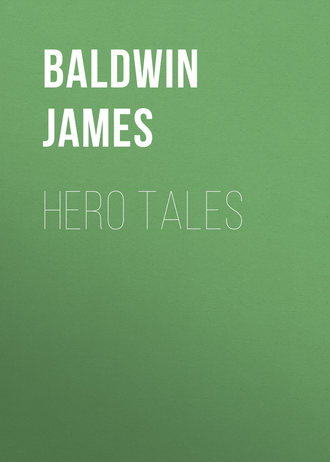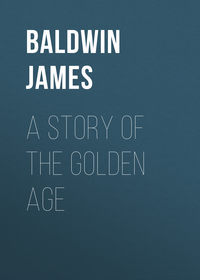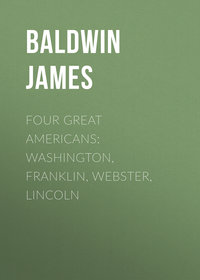 полная версия
полная версияHero Tales
"Brother," said Roland softly and gently, "thou hast not done this willingly. I am Roland, he who has loved thee so long and so well."
"Ah, comrade!" said Oliver, "I hear thee; but I cannot see thee. Pray forgive me if I have harmed thee."
"I am none the worse," answered Roland; "and there is naught to forgive."
Then the two brothers bent over from their steeds, and embraced each other; and amid much love and many hasty words of farewell, they parted.
And now all the French were slain, save only Roland and the archbishop. The hero was wounded in a dozen places: he felt his life-blood oozing away. Again he drew his ivory horn, and feebly sounded it. He would fain know whether Charlemagne were coming. The king was in the pass, not far away, and he heard the failing blast.
"Ah, Roland!" said he, "the battle goes ill with thee." Then he turned to his host, and said, "Blow loud your trumpets, that the hero may know that succor comes."
At once sixty thousand bugles were blown so loudly that the valley and the caves resounded, and the rocks themselves trembled. Roland heard it and thanked God. The Pagans heard it and knew that it boded no good to them. They rushed in a body upon Roland and the archbishop. Roland's horse was slain beneath him; his shield was split in twain; his hauberk was broken. The archbishop was mortally wounded, and stretched upon the ground. Again the trumpets of Charlemagne's host were heard, and the Pagans fled in great haste toward Spain.
Then Roland knelt by the side of the dying archbishop. "Kind friend, so good and true," said he, "now the end has come. Our comrades whom we held so dear are all dead. Give me leave to bring them and lay them in order by thee, that we may all have thy blessing."
"It is well," answered the good Turpin. "Do as thou wilt. The field is thine and mine."
So Roland, weak and faint, went all alone through that field of blood, seeking his friends. He found Berenger and Otho and Anseis and Samson, and proud Gerard of Roussillon; and one by one he brought them and laid them on the grass before the archbishop. And lastly he brought back Oliver, pressed gently against his bosom, and placed him on a shield by the others. The archbishop wept; and he lifted up his feeble hands and blessed them: "Sad has it been with you, comrades. May God, the glorious King, receive your souls in His paradise!"
Then Roland, faint with loss of blood, and overcome with grief, swooned and fell to the ground. The good archbishop felt such distress as he had never known before. He staggered to his feet; he took the ivory horn in his hands, and went to fetch water from the brook which flows through the Vale of Thorns. Slowly and feebly he tottered onward, but not far: his strength failed and he fell to the ground. Soon Roland recovered from his swoon and looked about him. On the green grass this side of the rivulet, he saw the archbishop lying. The good Turpin was dead.
And now Roland felt that he, too, was nigh death's door. He took the ivory horn in one hand, and Durandal in the other, and went up a little hill that lies toward Spain. He sat down beneath a pine tree where were four great blocks of marble. He looked at the blade Durandal. "Ha, Durandal," he said, "how bright and white thou art! Thou shinest and flamest against the sun! Many countries have I conquered with thee, and now for thee I have great grief. Better would it be to destroy thee than to have thee fall into the hands of the Pagan folk."
With great effort he raised himself on his feet again. Ten times he smote with Durandal the great rock before him. But the sword was bright and whole as ever, while the rock was split in pieces. Then the hero lay down upon the grass, with his face toward the foe. He put the sword and the horn under him. He stretched his right glove toward heaven, and an unseen hand came and took it away. Dead was the matchless hero.
Not long after this King Charlemagne with his host came to the death-strewn Vale of Thorns. Great was the grief of the king and of all the French, when they found that they had come too late to save even a single life. Roland was found lying on the grass, his face turned toward Spain. Charlemagne took him up tenderly in his arms, and wept.
"Friend Roland," said he, "worthiest of men, bravest of warriors, noblest of all my knights, what shall I, say when they in France shall ask news of thee? I shall tell them that thou art dead in Spain. With great sorrow shall I hold my realm from this time on. Every day I shall weep and bewail thee, and wish that my life, too, were ended."
Then the French buried their dead on the field where they had fallen. But the king brought Roland and Oliver and the archbishop to Blaye in France, and laid them in white marble tombs; and there they lie until this day in the beautiful little chapel of St. Roman's. And he took the ivory horn to Bordeaux, and filled it with fine gold, and laid it on the altar of the church in that city; and there it is still seen by the pious pilgrims who visit that place.
VOCABULARY OF PROPER NAMES
Ac ar nā' nĭ a, the most western province of ancient Greece. A chĭl' lēs (á kĭl' lēz), the ideal hero of the Greeks. Ae' gir (a' jĭr), in Norse legends, the ruler of the sea. Ag a mē' dēs (-dēz), one of the architects of the temple at Delphi. Ag a mĕm' non, king of Mycenae and leader of the Greeks. Aix (āks), a city of France, favorite residence of Charlemagne. A' jăx, a Greek hero second only to Achilles. Al ex ăn' drŏs, a name applied to Paris, prince of Troy. Al phē' ŭs, a hunter transformed into a river of Greece. Al thē' a, queen of Calydon, mother of Meleager. A mĭl' ĭ as, a mythical smith of Burgundy. And' vä rï, a dwarf, the keeper of the Rhine treasure. An tĭl' o chus (-kus), a Greek prince and friend of Achilles. A ŏs' tä, a town in northern Italy. Aph ro dī' tē, in Greek mythology, the goddess of love. A pŏl' lo, in Greek mythology, the god of music, poetry, and healing. Ar cā' dĭ a, a mountainous country in Greece. Ardennes (är dĕn'), a forest in northern France. Ar e thū' sa, a nymph loved by Alpheus. Ar' go, the ship that carried Jason and his companions. Ar' tē nĭs, twin sister of Apollo; goddess of the woods. Ar' thur, a heroic legendary king of Britain. As' as (äs åz), the gods of the North. As' gärd, in Norse mythology, the home of the gods or Asas. Ash' ta rŏth, an evil spirit. At a lăn' ta, an Arcadian princess and swift-footed huntress. A the' na, the goddess of knowledge, arts, and sciences. At' ro pŏs, one of the three Fates. Au' lis, a town on the east coast of Greece. Au tŏl' y cus, a famous Greek chieftain, grandfather of Odysseus. Av' a lon, fairyland (in mediaeval legends).
Băl' ĭ os, "Swift," one of the horses given to Peleus. Bäl' mŭng, the sword of Siegfried. Bē' a trĭce, the wife of Eego of Belin. Be gō' (bā gō'), duke of Belin and feudal chief of Gascony. Ber en ger' (-än zhā'), a friend of Bego. Blaye (blā), a seaport of France, 21 miles from Bordeaux. Bō' re as, the North Wind. Bor deaux' (-dō'), a city on west coast of France. Bŭr' gun dy, a duchy including a part of northeastern France.
Căl' chas (kăl' kăl), a soothsayer of Mycense. Căl' y don, a city in ancient Greece. Cas san' dra, a prophetess, the daughter of Priam. Cas tor, twin brother of Pollux and brother of Helen. Cĕn' taur, one of an ancient race inhabiting the country near Mount Pelion, said to have the bodies of horses. Charlemagne (shär' le mān), king of the Franks, 742-814. Cheiron (kī' ron), a Centaur famed for his wisdom. Clē ō pā' tra, the wife of Meleager. Clō' thō, one of the three Fates. Clyt' em nĕs tra, the wife of Agamemnon. Crete (krēt), an island southeast of Greece. Crĭs' sa, a gulf in Greece, now called Gulf of Corinth.
Där' da nus, ancestor of the people of Troy.
Dē' lŏs, a small island east of Greece.
Dĕl' phī, a town at the foot of Mount Parnassus, the seat
of the oracle of Apollo.
Dū răn' dal, the sword of Roland.
E' lis, a country in southern Greece. E' rin, the ancient name for Ireland. E' ris, the goddess of discord. Euboea (u bē' a), a large island east of Greece.
Fäf' nïr, a dragon that guarded the Rhine treasure. Fa năn' der, a cataract referred to in Norse mythology. Frō mōnt', duke of Bordeaux.
Gä' ne lon, a duke of Mayence noted for his treachery. Gä rin' (-rănh), one of the sons of Bego of Belia. Găs' cō ny, an ancient duchy of France. Gerin (zhẽ rănh'), a brother of Bego of Belio.
Hā' dēs, the land of the shades, or of the dead. Hault' clear, the sword of Oliver. He' bē, the goddess of youth and spring. Hĕc' tor, a prince of Troy, son of Priam. Hĕl' en, the wife of Menelaus, celebrated for her beauty. He lō ïse' (hā lō ēz'), the sister of Bego of Belin. He' ra, the wife of Zeus; often called Juno. Her' cu lēs (-lēz), a mighty hero of the Golden Age of Greece. Her' mēs (-mēz), the messenger of the gods; same as Mercury. Her nau din (her nō dănh'), a son of Bego. He sī' o nē, a princess of Troy, sister of Priam. Haenir (he' nïr), a companion of Odio. Hreidmar (hrīd' mar), the father of Regin. Hū' na land, a country mentioned in Norse mythology. Hy per bō' re ans, the people who lived beyond the North Wind.
I ä' sus, a king of Arcadia, father of Atalanta. I' das, the father of Cleopatra. I dŏm' e neūs, a king of Crete, friend of Menelaus. Il' ĭ os, the same as Troy; Ilium. I' lus, the founder of Ilios or Troy. Iph ĭ ge nī' a, a princess, the daughter of Agamemnon. I' ris, a messenger of the gods, personification of the rainbow.
Jā' son, a Greek hero, the leader of the Argonauts.
Kwä' ser, in Norse mythology, a being noted for his wisdom.
Lăc e dae' mon (lăs-), an ancient Greek city, same as Sparta. Lăch' e sĭs (lăk-), one of the three Fates. La ŏm' e don, a king of Troy, father of Priam. Lō' kī, in Norse mythology, the spirit of mischief. Lōr rāine', a region on the border between France and Germany.
Ma hŏm' et, an Arab, the founder of Mohammedanism. Măi' a gis (-zhē), a dwarf enchanter and magician. Mär seilles' (-sālz), a city of France on the Mediterranean.
Mär sïl' ĭ us, a Moorish king of Spain. Mayence (mä yŏns'), a city on the Rhine River. Mĕl e ā' ger (-jēr), a Greek hero, prince of Calydon. Mï' mer, in Norse mythology, the possessor of the well of wisdom. Môr' gan le Fāy, the queen of the fairies. My cē' nae, a city of ancient Greece.
Nä' mōn, Charlemagne's most trusted counsellor. Nē' rēus, "the old man of the sea," father of the sea nymphs. Nĕs' tor, king of Pylos, oldest of the Greek heroes at Troy.
O' dĭn, in Norse mythology the chief of the gods. O dys' seūs, the wisest of the Greek heroes; same as Ulysses. Oenone (ē nō' ne), a river nymph, the wife of Paris. Ogier (ō zhā), a Danish hero under Charlemagne. Oi' neūs, a king of Calydon, father of Meleager. Ol' ĭ ver, one of Charlemagne's paladins, comrade of Roland, O lym' pus, a mountain in Greece, the home of the gods. O rĕs' tēs, the son of Agamemnon. Orleans (ŏr lā ŏn'), an important city in France. Or sĭl' o chus, a king of the ancient city of Pherae.
Pal a mē' dēs, a Greek hero in the war with Troy. Păr' is, a prince of Troy, second son of Priam. Pär nas' sus, a mountain in Greece near Delphi. Pē' leūs, the father of Achilles. Pē' lĭ on, a mountain on the east coast of Greece. Pĕp' in, a king of the Franks, father of Charlemagne. Phoe' bus, another name for Apollo. Piēd' mŏnt, a district in northern Italy. Pŏl' lux, the twin brother of Castor, and brother of Helen. Po seī' don, supreme lord of the sea; same as Neptune. Prī' am, the last king of Troy. Pū ĕlle', an ancient forest in France. Py' los, an ancient town in the south part of Greece. Pyr' e nees, the mountains between France and Spain. Py' thon, the serpent slain by Apollo.
Rän, in Norse mythology, the goddess of the sea. Re' gin (-jĭn), a dwarf, the instructor of Siegfried. Rō' land, the most famous of Charlemagne's paladins. Ronce vaux' (-vō), a valley in Navarre, Spain, in the Pyrenees. Roussillon (roo sē' yôn'), an ancient district of France.
St. Omer (sĕn tō mâr'), a famous city in northern France. St. Quentin (sâăn kŏn tăn'), a city in northeastern France. Săl a mis, an island of ancient Greece. Sar' a cens, the Arab followers of Mohammed. Scae' an (skē' an), the principal gate of Troy. Sca măn' der, a river near Troy. Seine (sān), one of the principal rivers of France. Siēg' friēd, a mythical hero of the Rhine country. Sï' gyn, the wife of Loki. Skä de, in Norse mythology, the goddess of the snow.
Tĕl' a mon, a Greek hero, the father of Ajax. Thes sā' lĭ an, belonging to Thessaly in northern Greece. Thē' tis, a sea nymph, the mother of Achilles. Tro phō' nĭ us, one of the architects of the temple at Delphi. Tûr' pin, archbishop of Rheims, and paladin of Charlemagne.
Valenciennes (vä lŏn syĕn'), a city in northeastern France. Vŭl' can, the blacksmith of the gods.
Xanthos (zăn' thus), "Old Gold," one of the horses of Peleus.
Zeūs, the king of the gods; same as Jupiter.
1
Autolycus was a famous mountain chief who lived in rude state on the slopes of Parnassus and was noted for his courage and cunning. He was the grandfather of Odysseus (Ulysses), to whom the story is supposed to have been related.
2
Cheiron the Centaur lived in a cavern on Mount Pelion and was reputed to be the wisest of mortals. All the young heroes of the time, Jason, Achilles, and others, were his pupils and spent their boyhood with him. He is sometimes represented as having the head of a man and the body of a horse; but it is probable that he was only one of a race of men noted for their skill in horsemanship. This story is supposed to have been related by him to young Odysseus (Ulysses), who visited him in his cavern.
3
Menelaus, king of Lacedaemon, was the husband of Helen, the most beautiful woman in the world. At the time of his marriage to Helen all the princes of Greece had vowed to support him against any enemy who should attempt to defraud him of his rights. This and the following story tell of his visit to Troy and its results.
4
Regin, one of the last of the race of Dwarfs, was a master smith and by some said to be the teacher of Siegfried. The story is supposed to have been related to Siegfried in the dusky smithy of the dwarf.
5
The original of this tale is found in "The Song of the Lorrainers," a famous poem written by Jehan de Flagy, a minstrel of the twelfth century. In the "Story of Roland" it is supposed to have been related at the court of Charlemagne by a minstrel of Lorraine.
6
The vair and the gray,—furs used for garments, and in heraldry. Vair is the skin of the squirrel, and was arranged in shields of blue and white alternating.









